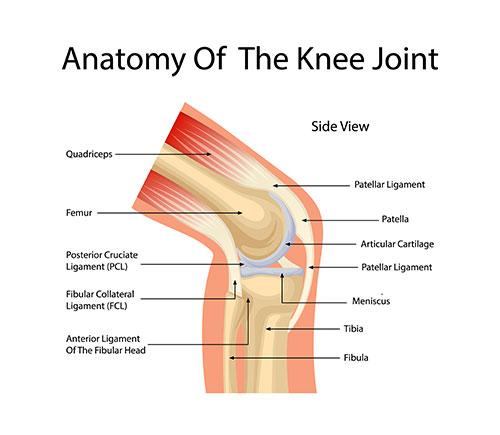Knee pain is a pervasive issue that can disrupt daily activities and significantly impact quality of life. With the desire to avoid surgical interventions, individuals are increasingly turning to non-invasive solutions for relief.
Among these options, chiropractic care has garnered growing interest for its holistic approach to managing knee pain.
Understand Knee Pain
Knee pain encompasses a range of discomfort, often stemming from injuries, mechanical problems, arthritis, or other issues affecting the knee joint’s components. Traumatic incidents like ligament tears or fractures, as well as chronic conditions like osteoarthritis, contribute to its prevalence.

Additionally, mechanical issues such as loose bodies or iliotibial band syndrome can lead to persistent discomfort. These conditions can affect ligaments, tendons, cartilage, or fluid-filled sacs surrounding the knee, impeding proper function and causing pain. Furthermore, types of arthritis like osteoarthritis, rheumatoid arthritis, or gout can lead to inflammation and degeneration within the knee joint.
Understanding the multifaceted nature of knee pain is pivotal in exploring effective non-surgical interventions for relief.
Non-Surgical Approaches to Knee Pain Relief
Non-surgical avenues for alleviating knee pain offer promising alternatives to invasive procedures. Options such as physical therapy, acupuncture, and chiropractic care provide comprehensive solutions without the risks associated with surgery.
These modalities prioritise natural healing mechanisms, aiming to address the root causes of knee pain rather than merely masking symptoms. Opting for non-invasive methods not only reduces the likelihood of complications but also promotes holistic wellness, emphasising the body’s innate capacity to heal itself.
The Role of Chiropractic Care
Chiropractic care emerges as a non-surgical cornerstone in the management of knee pain, offering holistic relief without invasive procedures.
Through precise adjustments, chiropractors target misalignments and dysfunctional movement patterns in the knee and pelvic joints, promoting optimal alignment and function. The efficacy of chiropractic care in mitigating knee pain is supported by a growing body of evidence, underscoring its ability to not only alleviate discomfort but also enhance overall musculoskeletal health.
By addressing underlying biomechanical issues, chiropractic interventions provide sustainable solutions for individuals seeking non-surgical alternatives for knee pain relief.
Benefits of Choosing Chiropractic Care
Considering chiropractic care for knee pain relief offers a range of advantages over surgical options and other non-invasive treatments, it stands out as a promising solution for individuals seeking sustainable relief from knee discomfort. With its personalised, holistic approaches, chiropractic care prioritises addressing the root causes of knee pain and promoting comprehensive healing.
- Personalised Treatment: Chiropractic care offers tailored interventions that address the unique needs of each individual, ensuring a personalised approach to knee pain relief.
- Holistic Approach: Unlike some non-surgical options that focus solely on symptom management, chiropractic care adopts a holistic perspective, considering the interconnectedness of the body’s systems and addressing underlying issues for comprehensive healing.
- Long-term Pain Relief: By targeting the root causes of knee pain, chiropractic adjustments facilitate long-term relief, reducing the likelihood of recurrence and promoting sustained improvement in mobility and function.
- Enhanced Mobility: Through gentle manipulation and rehabilitative exercises, chiropractic care improves joint mobility, allowing individuals to regain flexibility and engage in daily activities with greater ease.
- Minimal Risk: Chiropractic interventions are non-invasive and carry minimal risk compared to surgical procedures, making them a safer option for individuals seeking relief from knee pain without undergoing surgery.
What to Expect During Chiropractic Treatment
During chiropractic treatment for knee pain, patients can expect a thorough assessment of their condition, including a discussion of medical history and any previous treatments. Chiropractors will then perform a physical examination, focusing on the knee, pelvic and spinal joints and surrounding areas to identify misalignments or imbalances contributing to the pain. Treatment may involve gentle adjustments to realign the knee joint, along with targeted soft tissue techniques to reduce tension and improve mobility. Patients can also expect guidance on exercises and lifestyle modifications to support their recovery.
Addressing common concerns or misconceptions about chiropractic care, chiropractors prioritise patient comfort and safety throughout the treatment process. Contrary to misconceptions, chiropractic adjustments are typically gentle and non-invasive, with minimal discomfort reported by most patients. Chiropractors also emphasise the importance of open communication, encouraging patients to ask questions and express any concerns they may have during treatment.
Chiropractic Care for Knee Health
Black Chiropractic offers a promising pathway for addressing knee pain, prioritising natural healing mechanisms and avoiding invasive procedures. Whether your knee discomfort stems from an injury, arthritis, or another source, consider the benefits of chiropractic care as a viable treatment option.
By integrating chiropractic adjustments, personalised exercises, and lifestyle modifications, you can attain substantial relief from knee pain and enhance your overall mobility and well-being. Remember, while this guide offers valuable insights, consulting with our specialists at Black Chiropractic ensures a tailored approach to meet your specific needs.
Take the first step towards improved knee health. Call (03) 9509 7691 to schedule an appointment with us today.

